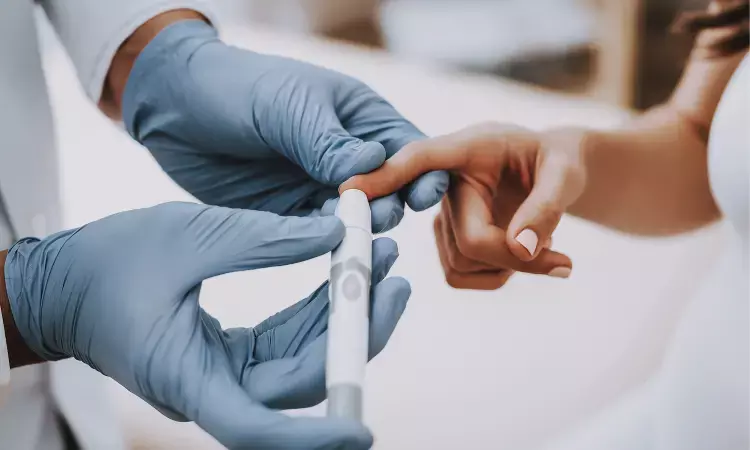- Home
- Medical news & Guidelines
- Anesthesiology
- Cardiology and CTVS
- Critical Care
- Dentistry
- Dermatology
- Diabetes and Endocrinology
- ENT
- Gastroenterology
- Medicine
- Nephrology
- Neurology
- Obstretics-Gynaecology
- Oncology
- Ophthalmology
- Orthopaedics
- Pediatrics-Neonatology
- Psychiatry
- Pulmonology
- Radiology
- Surgery
- Urology
- Laboratory Medicine
- Diet
- Nursing
- Paramedical
- Physiotherapy
- Health news
- Fact Check
- Bone Health Fact Check
- Brain Health Fact Check
- Cancer Related Fact Check
- Child Care Fact Check
- Dental and oral health fact check
- Diabetes and metabolic health fact check
- Diet and Nutrition Fact Check
- Eye and ENT Care Fact Check
- Fitness fact check
- Gut health fact check
- Heart health fact check
- Kidney health fact check
- Medical education fact check
- Men's health fact check
- Respiratory fact check
- Skin and hair care fact check
- Vaccine and Immunization fact check
- Women's health fact check
- AYUSH
- State News
- Andaman and Nicobar Islands
- Andhra Pradesh
- Arunachal Pradesh
- Assam
- Bihar
- Chandigarh
- Chattisgarh
- Dadra and Nagar Haveli
- Daman and Diu
- Delhi
- Goa
- Gujarat
- Haryana
- Himachal Pradesh
- Jammu & Kashmir
- Jharkhand
- Karnataka
- Kerala
- Ladakh
- Lakshadweep
- Madhya Pradesh
- Maharashtra
- Manipur
- Meghalaya
- Mizoram
- Nagaland
- Odisha
- Puducherry
- Punjab
- Rajasthan
- Sikkim
- Tamil Nadu
- Telangana
- Tripura
- Uttar Pradesh
- Uttrakhand
- West Bengal
- Medical Education
- Industry
Metformin and insulin improve risk factors of cardiovascular and cerebrovascular disease in type 1 diabetes

China: In people with type 1 diabetes, metformin can improve cerebrovascular and cardiovascular risk factors through non-hypoglycemic multiple pathways, says a study published in Diabetes Research and Clinical Practice.
The researchers wrote, "there is strong evidence supporting extensive metformin use to improve the risk factors of macrovascular with type 1 diabetes mellitus (T1DM), including children, not just in obese or adults."
Intensive insulin treatment to obtain normal HbA1c can reduce the complications of T1DM. Remarkably, a study of 19 countries showed that only 30% of T1D patients had HbA1c < 7.5 % and at least 30 % of individuals with T1D had poor HbA1c (>9.0 %). However, strict control of blood sugar can lead to excessive insulin use which can reach 1.5-2U/kg/d. Excessive use can lead to weight gain, blood pressure (BP), or an increase in low-density lipoprotein cholesterol (LDL).
In teens with T1DM, the increase of hormones and changes in body composition make the situation even worse, which can result in insulin resistance (IR) progression. IR can lead to fastened atherosclerosis progression. Recent studies have shown that metformin may reduce carotid intimal media thickness (cIMT) in T1DM patients. Also, it has been recently shown to improve many negative effects of stroke. Metformin lowers blood sugar levels and insulin sensitivity through various mechanisms.
Against the above background, Wei Song, The Second Hospital, Cheeloo College of Medicine, Shandong University, Jinan, China, and colleagues aimed to clarify whether metformin addition to insulin treatment improves cerebrovascular and cardiovascular risk factors in people with type 1 diabetes.
For this purpose, the researchers the electronic databases for randomized controlled trials that compared the safety and efficacy of metformin with placebo for risk factors of cerebrovascular and cardiovascular disease among T1D patients, and a meta-analysis was conducted.
The study led to the following findings:
· Thirteen cardiovascular studies were identified.
· In the metformin group, mean carotid intimal media thickness was significantly reduced by 0.03 mm, ascending aortic pulse wave velocity by 6.3 m/s, descending aortic wall shear stress by 1.77 dyn/cm2, insulin daily dose by 0.05 U/kg/d, body weight by 2.27 kg, fat-free mass by 1.32 kg, body mass index by 0.58 kg/m2, hip circumference by 0.29 m, and low-density lipoprotein by 0.16 mmol/L.
· In the metformin group, flow-mediated dilation was increased by 1.29 %, glucose infusion rate/insulin by 18.22 mg/(kg⋅min)/μIU/μL, and waist-to-hip ratio by 0.02.
· The metformin group showed no differences in blood pressure, reactive hyperemia index, waist circumference, triglyceride, total cholesterol, high-density lipoprotein cholesterol, or body mass index Z score.
· For cerebrovascular studies were identified. But none of them had a risk factor assessment.
The researchers concluded, "Through non-hypoglycemic multiple pathways, metformin can ameliorate cerebrovascular and cardiovascular risk factors in patients with T1DM."
Reference:
Xu, Linlin, et al. "A Combination of Metformin and Insulin Improve Cardiovascular and Cerebrovascular Risk Factors in Individuals With Type 1 Diabetes Mellitus." Diabetes Research and Clinical Practice, vol. 191, 2022, p. 110073.
Dr Kamal Kant Kohli-MBBS, DTCD- a chest specialist with more than 30 years of practice and a flair for writing clinical articles, Dr Kamal Kant Kohli joined Medical Dialogues as a Chief Editor of Medical News. Besides writing articles, as an editor, he proofreads and verifies all the medical content published on Medical Dialogues including those coming from journals, studies,medical conferences,guidelines etc. Email: drkohli@medicaldialogues.in. Contact no. 011-43720751


